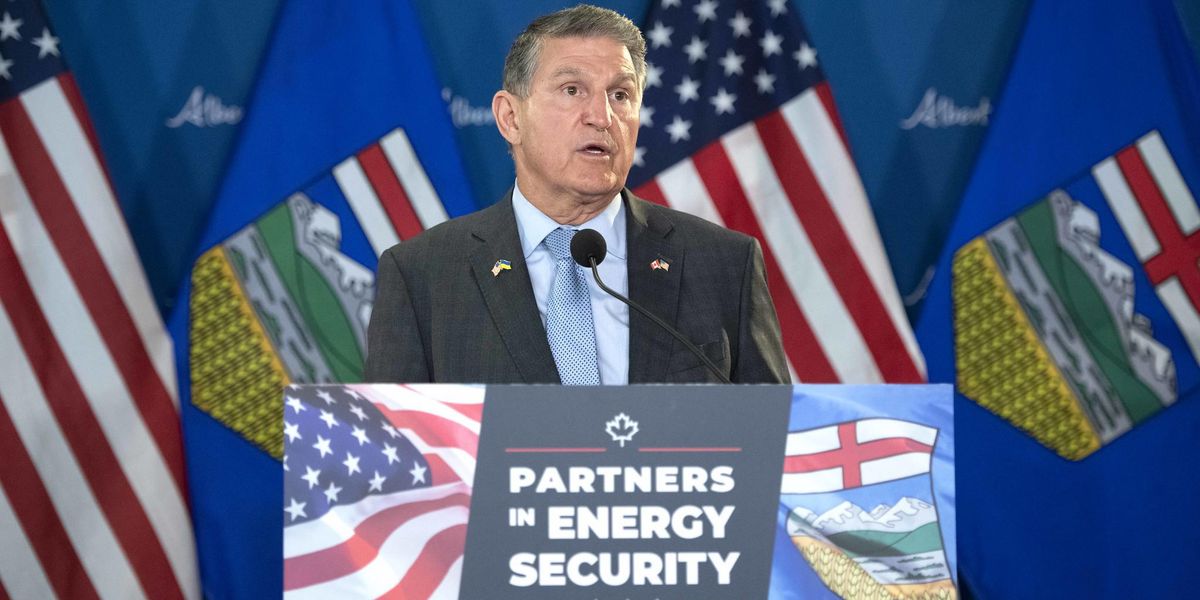
This week President Biden laid out a set of executive actions aimed at curbing climate change in light of recent setbacks on the issue.
Even with Democrats controlling the White House, House, and Senate for the past two years, climate action has been largely stalled. So, when it comes to Congress, who is the most influential Republican helping to block the Biden agenda?
No, it’s not Minority Senate Leader Mitch McConnell of coal state Kentucky. He’s an Olympian-level obstructionist, but not the gold medalist on blocking climate action.
And no, it’s not the Babe Ruth of climate denial, Senator James Inhofe of Oklahoma. He announced his retirement to take effect in January, shortly after his 88th birthday.
Okay, it’s kind of a trick question. The Senator who’s done more to advance the GOP agenda on climate and energy is lifetime Democrat Joe Manchin (D-WV).
What’s that you say? How can a “D” be the Leader of the “R” Pack on anything?
Because the Senate’s King of Coal is the holder of all the Democrats’ cards as its 50th member. And even that math is complicated. There are actually 48 card-carrying Democrats. New Englanders Bernie Sanders and Angus King are Independents who caucus with the Dems, and Vice President Kamala Harris wields the tie-breaking vote in her role as President of the Senate.
Thus, Democrats have the slimmest possible advantage in the Senate. Their leadership in the House is only slightly more stable.
In the Senate, the loss of a single Democrat’s support can doom a bill. That one lost vote is usually Manchin’s, and last week, after painstaking negotiations with his fellow Democrats, Manchin announced that he’s walked away from a core portion of Biden’s Build Back Better plan, including more than $300 billion for climate projects. There is little hope that the major White House effort on climate change can be salvaged.
So if Manchin behaves like a Republican, why hasn’t he switched parties? Or why haven’t frustrated Democrats helped him out the door? And just exactly what makes Manchin tick?
That may be a moot point if Republicans win big in the midterms on November 8, or if Biden becomes a one-termer on Election Day 2024. That’s also Manchin’s day to stand for re-election, should he choose to do so at age 77.
The Making of Manchin
Joe Manchin was born and raised in a southern West Virginia coal town. Injuries ended a promising football career at West Virginia University. He founded Enersystems, a coal brokerage business now run by his son. But his investment reportedly brought his wealth into the low millions.
He spent much of the 1980’s and 1990’s in the state legislature, mounted an unsuccessful campaign for governor in 1996, and a successful one for Secretary of State in 2000.
In 2004, he won the West Virginia governorship. Two years later, he took his turn on the national stage when a high-profile coal mining disaster claimed 12 lives at Sago Creek, West Virginia.
Manchin consistently drew high approval ratings as governor, and when the state’s legendary U.S. Senator Robert Byrd died in 2010, Manchin won a special election to replace him. His campaign featured a TV ad in which Manchin fired rifle bullets through a copy of proposed Environmental Protection Agency (EPA) regulations on climate change.
He easily won re-election to a full term in 2012 and beat back a stiff challenge from the state’s Attorney General, Patrick Morrissey, in 2018. As AG, Morrissey was the lead plaintiff in the case where the Supreme Court stripped the EPA of much of its power to regulate greenhouse gases last month.
The League of Conservation Voters gives Manchin a lifetime score of 56% — about halfway between the scores in the 80% and 90% range that LCV typically awards Democrats, and the 10% to 20% scores typical for Republicans.
He has voted against federal funding for Planned Parenthood, and he’s voted to restore that funding. He’s generally supported Republican issues on immigration. Manchin is part of a bipartisan effort to reform the 1887 Electoral Count Act, a key component in Trump’s effort to overturn the 2020 presidential results.
During the Trump years, Manchin voted with Trump a bit more than 50% of the time, according to Congressional Quarterly.
The White House is reportedly both furious with Manchin and terrified that a public feud will chase the West Virginian straight into the arms of the Republicans. He has consistently ranked at or near the top of the Congressional lists of recipients of oil, gas, and coal money.
Yes, but how easy would it be for Manchin to switch?
In 2016, coal billionaire and Democrat Jim Justice was elected West Virginia’s Governor. In August of 2017, Justice abruptly switched parties, leaving Manchin as the state’s last statewide Democrat in office. Both Justice and Manchin remain strongly popular.
Justice was re-elected in 2020 as a Republican by a nearly two-to-one margin.
Here are two items I’ve written about Manchin’s unique position before: Here and here.
Peter Dykstra is our weekend editor and columnist and can be reached at pdykstra@ehn.org or @pdykstra.
His views do not necessarily represent those of Environmental Health News, The Daily Climate, or publisher Environmental Health Sciences.

